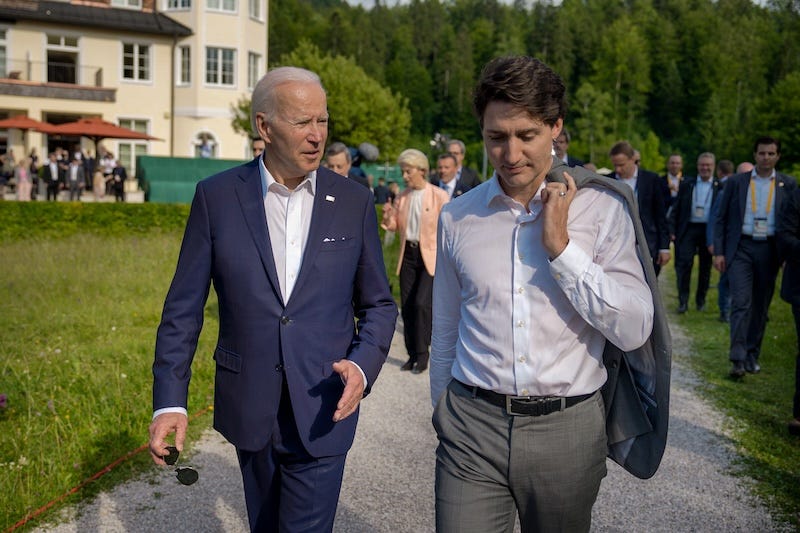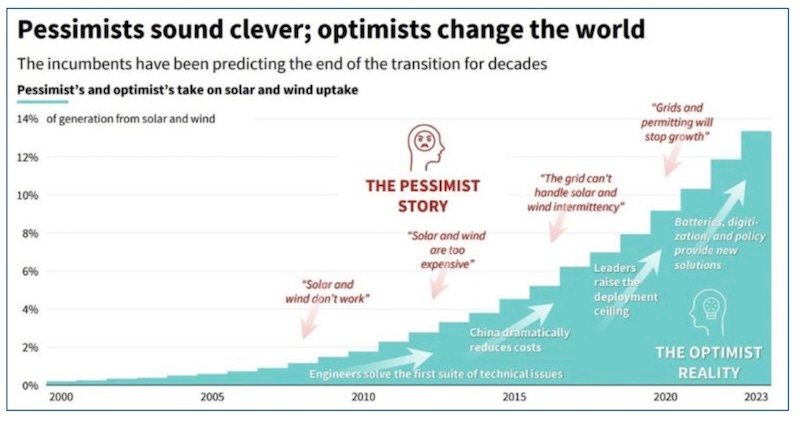What Now? What's Next?
The week saw tectonic shifts in national politics in Canada and the United States. Suddenly, climate plans are at risk across most of North America—maybe for better, quite possibly for much worse.
If you like your energy and climate policy stable, steady, and predictable, this probably isn’t your decade. It may not even be the lifetime you would have chosen. And it certainly hasn’t been your week.
On Monday, a by-election in the former Liberal stronghold of St. Paul’s gave the federal Conservatives their first House of Commons seat from Toronto since 2011, ending any doubts about whether a government led by Justin Trudeau could survive the next election.
Then on Thursday, a breathtakingly incoherent, dazed, aimless debate performance by U.S. President Joe Biden pushed fears about a Trump 2.0 dictatorship to the max and beyond, prompting a parade of Democratic insiders to defend their incumbent leader while others began searching desperately for a “break glass” plan to salvage their campaign.
That would be shorthand for “break glass in case of fire”.
From a strictly non-partisan standpoint, this isn’t a climate and energy story. Unless we believe in one-party rule, we know that elected officials come and go. The pendulum swings, and once in a while, it goes into orbit.
When that happens, the world outside politics reacts. Weirdly, today’s evidence comes from the often climate evidence-free Wall Street Journal, with a report that U.S. clean energy leaders like First Solar and Sunnova lost share value after the debate—indicating that investors were “pricing in” a Trump win.
That’s just the latest proof point that each of these incumbents, each in their own way and equivocal as their overall records have been, have been historically good at introducing decarbonization policies and repositioning their countries from petrostates to clean energy powerhouses. If they lose their elections, they’ll be replaced by extremist opponents who will cheerfully burn that progress to the ground.
None of the gains we’ve seen have been nearly enough to contain a mounting, global climate emergency. The United States is still the world’s biggest oil and gas producer, and still intent on an energy transition that includes gas. No Canadian should ever forget that Trudeau made us all involuntary owners of a pipeline megaproject that promptly went light years over budget to carry a product that fries the planet when used as directed. And Ottawa is still helping to bankroll liquefied natural gas projects whose methane emissions will fry things 84 times faster than carbon dioxide over a 20-year span.
And yet…for better and for worse, on good days and bad, Trudeau and Biden have each been the best climate leaders their countries have seen to date. We surely need more, better, faster, in both countries and around the world. But if this past week were the end of the election story, we could count on the next round being far worse.
Thankfully, even now, the last chapters of that story have yet to be written. Over the next few months, it’s going to be up to all of us to write them. Same as it ever was.
The Week the Ground Shifted
Decades ago, I remember one pundit comparing Canadian energy policy and politics to the geological process of plate tectonics—long periods of time with things quietly percolating away beneath the surface, with the occasional earthquake when all of that powerful force breaks through, just to remind us that something’s actually going on.
It’s an unsettling coincidence that the earthquake hit in both countries at once. But that’s the week it’s been. And there’s more to the follow, with the United Kingdom going to the polls July 4 and a week of high-stakes voting kicking off in France today.
I was attending a conference and meetings in Washington, DC, for most of this past week, so I got to watch Biden’s epic meltdown and Trump’s toxic tsunami of blather and lies with two friends from the U.S. Northeast. Their looks of horror and disbelief as the debate unfolded said it all: as Biden fell apart in real time, with an audience of 51 million looking on, they were afraid they were watching their country implode before their eyes.
What we didn’t see, what most Americans outside the country’s presidential swing states missed, were the targeted ads the Trump campaign bought during the two scheduled breaks in the action, reinforcing his fact-free messaging from the debate itself. At last count, Trump held small leads in five of those states.
The morning after, everything in Washington looked so normal. Not at all like a political neutron bomb had just fallen on the city that likes to style itself the world’s mightiest capital. It was comfortably warm but not yet overwhelmingly hot and humid. On the outdoor patio of the small, funky hotel where I stayed my last two nights in town, the birdsong was glorious.
Those birds must have turned in early and missed the debate. “The climate isn’t the only thing in crisis,” wrote HEATED climate journalists Arielle Samuelson and Emily Atkin, in a post headlined Night of the Living Dead.
Countering the Gish Gallop
“It wasn’t that Trump himself did well; the former president spouted a veritable fountain of lies from abortion to inflation to his environmental record,” they recounted. “But while Trump spoke confidently and at least vaguely coherently, Biden displayed a shocking inability to do the same. The president was rambly, mumbly, and wide-eyed like a zombie deer in highlights. He may have spoken truthfully, but he was woefully unable to counter Trump’s lies in even the most minimally effective way.”
The parallel between the two looming elections has its limits—Trudeau is nearly three decades younger, a gifted communicator who’s said to have off-the-charts emotional intelligence.
But voters are signalling loud and clear that they’re sick of both of them. And both leaders get tripped up trying to explain and defend the details of complicated, nuanced policies against the raging simplicity of Trump’s sociopathy or Conservative leader Pierre Poilievre’s three-syllable rhymes.
Even when they haven’t burdened themselves with a technocratic construct like the carbon tax as the leading edge of their fight against climate change.
In the U.S. debate, it was never going to be a fair fight, Atkin wrote: Trump confidently “spouting bullshit” (his technique’s formal name is the Gish Gallop) against Biden struggling to “communicate his own points truthfully while countering Trump’s lies, all while being an 81-year-old with a speech impediment.”
But unfair as it might be, it’s the reality of fighting disinformation. Climate experts know this well: If you want to beat a bullshit artist, you have to be better than them at communicating. If you’re not good at communicating, that’s OK—but don’t put yourself in a position where you’re debating them in a huge public forum. Because if you do, and you fail, you’ll ultimately harm your cause—and by extension, the planet.
Which means the tectonic plates still have some shifting to do. Because the best outcome for the climate response we need—the most inspired, responsible leadership that these two established leaders can now show—is for both Biden and Trudeau to stand aside.
Time to Be Moving On
There’ve been multiple calls for exactly that, on both sides of the border. In Canada, Chrétien-era cabinet ministers Wayne Easter and John Manley both said it was time for Trudeau to go, before former environment and climate minister Catherine McKenna became the first one-time member of the PM’s own inner circle to publicly offer him the same advice.
"The Liberal Party isn't about one person. It's about the values it stands for and it's about improving the lives of Canadians," she told CBC in a statement. "The prime minister has a legacy to be proud of, but it's time for new ideas, new energy, and a new leader. There's too much at stake in this election, especially on the economy and the climate."
The same CBC story had backbencher Sophie Chatel (L-Pontiac) ducking a question about whether Trudeau should stay or go. "It's not something that I feel comfortable to share,” she said. “It's discussions that are being done internally. I think ultimately it's his decision, and I respect that.”
Backbencher Wayne Long (L-Saint John-Rothesay), who won’t be seeking re-election, was more forthright. "For the future of our party and for the good of our country, we need new leadership and a new direction," he told caucus colleagues, in an email obtained by CBC News. "The voters have spoken loud and clear they want change. I agree."
"Well said!", replied Newfoundland and Labrador MP Ken McDonald (L-Avalon).
On Thursday—days after Trudeau’s meltdown in St. Paul’s, hours before Biden’s collapse in Atlanta—Toronto Star contributing columnist Justin Ling reported definitively that at least some Liberal caucus members were in revolt against their current management. “I overheard it in a train station,” he headlined, after Environment and Climate Minister Steven Guilbeault “spent Thursday working the phones with Liberals across the country trying to take stock of how bad things really are.”
How could Ling be so sure? “I know this because Guilbeault did some of this work in public, in the Via Rail business lounge, as he sat next to Canada’s least-recognizable columnist: Me.” (I’m guessing that, in the Great Least-Recognizable Columnist Sweepstakes, Ling may have just disqualified himself by showing that he’s never heard of The Weekender.)
Without moving a muscle, Ling said he overheard Guilbeault on three separate calls, all trying to sort out which MPs might be most inclined to push Trudeau toward the door. “If we’re not trying to address it, it will fester,” he said at one point. “So this conversation will need to happen whether we want (it) to or not.”
Courageous Decisions Ahead
With about 15½ months to go before an October, 2025 vote, news coverage in Canada is beginning to shift toward the logistics and possible candidates for a Liberal leadership race, while Trudeau steadfastly maintains he’s staying put.
Things are a bit more complicated in the U.S. Biden is the sitting president and the Democrats’ presumptive nominee, with firm control over his party’s internal levers and an inner circle of advisors who are reportedly determined to see him continue into the fall campaign. The general consensus among U.S. analysts is that there’s still time for Democrats to make a switch before their mid-August convention, but only if Biden agrees to go.
So far, it doesn’t seem likely. But that hasn’t stopped a flood of possible scenarios for what a transition might look like.
The most gracious and hopeful comes from author, climate campaigner, and Third Act co-founder Bill McKibben, who’s advising everyone to “give Joe some room” to make the right choice. Far from the unmitigated disaster that most observers are predicting, and that is still a very real possibility, McKibben foresees a possible changing of the guard that would
open up the possibility not just of decisively defeating Trumpism, but of pulling the country out of the polarized death spiral we’ve fallen into. But it’s going to take a while to play out, I think—time that we should grant Joe Biden, who’s at one of those hard, interesting, decisive points that come in the course of a life and of a nation.
The choice ahead for Biden is not so different from the one our parents faced (or will face, depending on your age and theirs) when they decided to move into a retirement community. But, McKibben writes,
I think Biden will get this. He’s a patriot, he’s spent his life in service, he clearly understands that the country is more important than any person. So he will steel himself to the task of watching the tape of last night’s debate, and he won’t make excuses. And then he may say ‘I’ve done my part well—I rescued America from Trump and from COVID. And now I have one great duty left, which is to pass on the reins. So I’m freeing up my delegates to choose someone else.’
McKibben points to Michigan Governor Gretchen Whitmer as the kind of candidate who would give Democrats, and the entire United States, the reset they so desperately need.
Whitmer, for instance, could say—’these MAGA guys literally tried to kidnap and kill me. But I stood them down easily, and I didn’t let it get to me. Because we have work to do.’ That would be exciting. We need exciting. We need new. We need a door out of the emotional prison that our country has become. And now we have, unexpectedly, a moment that might give us that door.
It doesn’t look likely just yet. But I really hope McKibben is right.
Trudeau has decades to go before he has to think about a retirement home. But his political career has reached the same stage as Biden’s. With all his flaws and missteps, he saved our country—at great personal cost to himself and many of his ministers—from Stephen Harper’s warped view of Canada as a fossil energy superpower, with his “barbaric practices” snitch line and his endless misuse of the Canada Revenue Agency to persecute legitimate charities.
And let’s not forget, not ever, that Pierre Poilievre is positioning himself as Stephen Harper without the guardrails.
But every politician everywhere has a best-before date. Biden and Trudeau have both passed theirs. For the sake of the legacies they’ve fought for, and for the climate momentum they’ve helped build, the most honourable and effective thing they can each do is to pass the torch to successors who can carry on and accelerate the fight.
Mitchell Beer traces his background in renewable energy and energy efficiency back to 1977, in climate change to 1997. Now he and the rest of the Energy Mix team scan 1,200 news headlines a week to pull together The Energy Mix, The Energy Mix Weekender, and our weekly feature digests, Cities & Communities and Heat & Power.
Chart of the Week
Big Solar Outshines Big Oil as Emerging Giants Top ‘Powerhouses of Petroleum’
Montreal Adds Nine More Car-Free Streets after ‘Mind Blowing’ Success
Oil Sands Lobby Scrubs Website After Greenwashing Curbs Pass Parliament
‘Tsunami’ Engulfs Alberta Renewables as Provincial Moratorium Unsettles Sector
Renewable Energy Growth Outpaces Fossil Fuels for the First Time
Ontario Bars Solar on Prime Farmland, Misses Middle Ground in Agrivoltaics
Ontario’s New Overnight Power Price Is ‘Rocket Fuel’ for Rooftop Solar
Distributed Grid Could Absorb Peak Demand, Wipe Out Energy Insecurity by 2035: Deloitte
Thousands Perish In Unseasonable Heat as ‘Dangerous Climate Change is Upon Us’
The gas network keeps growing. The last customers could be left paying for it all (Canadian Broadcasting Corporation)
U.S. pledges to be a climate finance leader but defends gas expansion (The Guardian)
A mine proposed in B.C. would supply the fracking industry — by way of 55,000 truck trips per year (The Narwhal)
After Churchill Falls fire jumps river, officials hope for rain to help firefighting efforts (Canadian Broadcasting Corporation)
How to survive a heat wave on a fixed income (Grist)
Texas could face rolling blackouts in August, as Houston officials announce cooling centres (Houston Public Media)
Air freight greenhouse gas emissions up 25% since 2019, analysis finds (The Guardian)
Ultra-fine particles from planes put 52 million Europeans at risk of serious health conditions (Transport & Environment)
Billionaire Tom Steyer: 'Plug and play' bank loans to fossil fuel projects are 'insane' (GreenBiz)
Brazil Leads in Scaling Up Sustainable Finance (Climate Bonds Initiative)
Europe’s largest renewable producer scales back plans for wind and solar plant (Financial Times)
Fire at South Korean lithium battery plant kills 22 (Financial Times)






